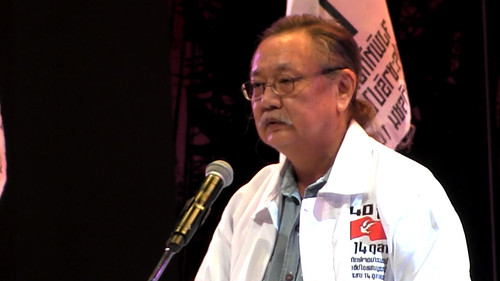In his hour-long speech at Thammasat University last Sunday on the eve of the 40th anniversary of the Oct 14 uprising, Seksan Prasertkul, former student leader, now writer and university professor, clarified his stance on Thai politics.
Seksan, an influential intellectual for many generations, has not spoken to the public on the issue for almost a decade, making his speech much anticipated by the public, both red and yellow shirts.
He pointed out the obstacles to Thailand’s democracy, saying that the coup in 2006 underestimated the power of the ‘new middle class’ that arose after the significant economic and social changes that came with globalization and the 1997 constitution.
 Seksan Prasertkul
Seksan Prasertkul
The former Dean of the Political Science Faculty of Thammasat University said he viewed the coup as an attempt by the ‘old power’ and ‘old middle class’ to resist these changes, and criticized it as a “major step back for Thai democracy.”
“How can we, as free men, fulfil ourselves if we cannot choose the government we are satisfied with and tell the world what we want?” he said. “How can human equality be achieved if not with equal rights and votes to determine our nation’s fate?”
The former communist fighter said that authoritarianism, the patronage system and nationalism are still prevalent in Thai society, making it quite difficult to entrench democracy as well as a culture of liberty, equality and justice.
While the force of change in the 1970s was mainly the student movement, he said the drive for democratic change now falls on members of the ‘new middle class’ that are closely aligned with the ‘new capitalists,’ referring to those thriving during the Thaksin Shinawatra government from 2001 to 2006.
As ‘unbelievable’ as it is, he said the ‘new middle class,’ who have risen in numbers due to economic changes in the rural areas, have become allies with the Thaksin government since they found themselves benefitting from the policies which provided greater access to economic opportunities, healthcare and education for the people.
By ‘new middle class,’ Seksan said he meant farmers in rural areas who, apart from moving to work in Bangkok as labourers, also turned to become entrepreneurs and another important set of players in the competitive market.
“[The new middle class] has always been overlooked and invisible, so it is not strange that they would need to struggle to declare their existence,” said Seksan
“Therefore these people would need the political space to increase their bargaining power in the market and push for the policies that are relevant to their interests,” explaining that they became highly dissatisfied with the 2006 coup which ousted Thaksin.
In order for a democratically elected government to thrive, however, it should care not only about its constituency, but it must also protect marginalized people whose lives are affected by state or corporate development projects, he warned.
Whether it is environmental groups or community rights groups, Seksan said the government must find new allies in order to get democracy to take root in Thailand and avoid bloodshed in the future.
In 2010, Seksan joined the now-defunct National Reform Committee led by former Prime Minister Anand Panyarachun after the red shirt crackdown in 2010 in an attempt to bring about national reconciliation.
Responding to Seksan’s speech, Somsak Jeamteerasakul, history professor from Thammasat University and former student leader in the 1970s, wrote in Facebook that Seksan’s overrated speech failed to mention the issue of the monarchy, which he viewed as a critical problem in Thai politics today.
He said the “liberal” or “democratic” intellectuals, including Seksan, often raise the issue of economic inequality when talking about Thailand’s problems of democracy, but this only provides them with the leeway to “sound progressive,” without having to tackle real, difficult problems.
“This merely reflects the shallowness or political weakening [of the intellectuals] to elaborate straightforwardly on political issues and structural problems of state power, especially the status and power of the monarchy,” wrote Somsak


